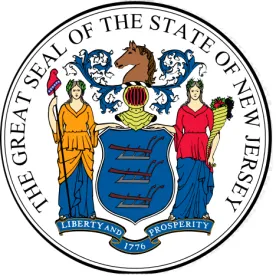Here are the most recent health care related regulatory developments as published in the New Jersey Register in June 2020:
-
On June 1, 2020, at 52 N.J.R. 1150(a), the Department of Health Commissioner issued a notice of rule waiver/modification/suspension pursuant to Executive Order No. 103 (2020) related to the qualifications an administrator of an assisted living residence or comprehensive personal care home. This waiver was issued to ensure that a sufficient number of qualified administrators are available to staff New Jersey’s assisted living facilities and comprehensive personal care homes so that the facilities can effectively address the increasing number of both staff and residents being diagnosed with or suspected of having COVID-19. Section 8:36-3.2 has been temporarily amended to permit individuals whose Assisted Living Administration certification had become inactive within the past three years (April 1, 2017-April 1, 2020) to restore their licenses provided that they have not been disqualified, is not under an investigation by the ALA panel or other state licensing authority, does not have a suspended, revoked or restricted certification and no failed a criminal background check. If these bars have been cleared, then the applicant must complete a 10 hour Temporary Living Administrator Program sponsored by Longtree & Associates, LLC; successfully pass a criminal background check pursuant to N.J.A.C. 8:43I-4; and pay the current Assisted Living Administrator certification fee.
This temporary rule waiver/modification, as well as any provisional certifications issued thereunder, will expire 45 days after the end of the Public Health Emergency declared by Governor Philip D. Murphy in Executive Order No. 103 (2020). After the provisional certifications issued under this subsection have expired, individuals whose Assisted Living Administrator certifications have expired will no longer be permitted to function as certified assisted living administrators. Individuals wishing to obtain full certification as an assisted living administrator will be required to successfully complete all the requirements for restoration of such certifications set forth in this section (excluding the new subsection).
-
On June 1, 2020, at 52 N.J.R. 1151(a), the Department of Health Commissioner issued a notice of rule wavier modification/suspension pursuant to Executive Order No. 103 (2020) related to the time period within which a certified medication aide candidate must sit for the medication aide exam after completing his or her medication aide training course. Pursuant to this rule waiver/modification, if a candidate’s deadline to sit for the standardized examination falls between March 1, 2020 and May 31, 2020, then the candidate shall have an additional six (6) months from the original deadline to sit for the examination. For example, if a candidate was required to sit for the examination by March 1, 2020, the deadline will be extended to August 31, 2020. The remaining provisions set forth in N.J.A.C. 8:36-9.2 shall remain in effect.
N.J.A.C. 8:36-9.2(c) requires a certified medication aide candidate to sit for the Department of Health approved standardized examination within six (6) months of successfully completing an approved medication administration training course. The standardized examinations are administered by PSI Testing Centers. In an effort to protect the community from the spread of COVID-19, PSI Testing Centers are closed and no longer administering standardized examinations. As a result, medication aide candidates that successfully completed the approved training course are not able to sit for the standardized examination within the specified time frame. Accordingly, an extension of the time period that certified medication aide candidates have to sit for the exam is warranted so that the candidates do not have to unnecessarily retake the training course to qualify for the exam and gain certification after the public health emergency concludes.
-
On June 1, 2020, at 52 N.J.R. 1151(b) the Department of Health Commissioner issued a notice of rule wavier modification/suspension pursuant to Executive Order No. 103 (2020) regarding nurse aid competency. N.J.A.C. 8:39-43.1 sets forth certain criteria for an individual to qualify to work as a Certified Nurse Aide (CNA) in a licensed long-term care facility in New Jersey. In order to increase the number of direct care staff available to work at long-term care facilities, the Department is modifying the requirements of N.J.A.C. 8:39-43.1. Pursuant to this rule waiver/modification, Personal Care Assistants (PCA) and Certified Medical Assistants (CMA) are temporarily permitted to function in the role of a CNA in licensed long-term care facilities within New Jersey so long as the PCA or CMA meet the following conditions: (1) the CMA or PCA must complete the Temporary Nurse Aide training course at http://educate.ahcancal.org/products/temporary-nurse-aide prior to functioning as a CNA; (2) the facility shall provide staff a basic orientation addressing fire safety, infection control, and abuse prevention prior to allowing them to perform any duties in the facility; and (3) the facility shall maintain relevant supervision requirements for CMAs and PCAs functioning as CNAs. The remaining provisions set forth in N.J.A.C. 8:39-43.1 shall remain in effect.
Long- term care facilities that take action under the terms of this waiver/modification must also provide a written report to the Department regarding the facility’s implementation. This waiver is effective only during the period of Public Health Emergency declared by Governor Philip D. Murphy in Executive Order Nos. 103 and 119. Within 45 days after the Public Health Emergency has ended, PCAs and CMAs will no longer be permitted to function in the role of a CNA and anyone wishing to act as a CNA will be required to satisfy the competency requirements set forth in N.J.A.C. 8:39-43.1. Long- term care facilities will also be required to resume operating in accordance with all licensure standards within 45 days after the Public Health Emergency has ended.
-
On June 1, 2020 at 52 NJ.R. 1154(a) the Department of Health Commissioner issued a notice of rule wavier modification/suspension pursuant to Executive Order No. 103 (2020) related to recertification of EMTs whose certifications have expired. Pursuant to this rule waiver and modification, individuals whose EMT certification expired within the past five years (April 1, 2015 to April 1, 2020) are eligible for “COVID-19 EMT re-entry” so long as: (1) the applicant is not currently under investigation by any State EMT licensing authority; (2) the applicant does not have a proposed or final enforcement action pending or entered against him or her by any State EMT licensing authority; (3) the applicant is not excluded from acting as an EMT pursuant to a settlement reached with any State EMT licensing authority; (4) the applicant has not been cited for impersonating an EMT and/or Paramedic; (5) the applicant does not have a criminal history or pending criminal charges referenced in N.J.A.C. 8:40A-10.2; and (6) the applicant successfully completed all continuing education audits conducted by the Department while certified as an EMT. If an applicant does not fall into one of these disqualification categories, the applicant may proceed with the “COVID-19 EMT re-entry” process that is outlined in the regulations. Upon successful completion of these requirements, the Department will issue the applicant a 6-month provisional EMT certification. To obtain full certification as an EMT, the applicant must successfully complete a New Jersey approved refresher program and achieve a passing score on the National Registry EMT-Basic Certification Examination, as set forth in N.J.A.C. 8:40A-7.6, by the end of the provisional period. Individuals issued provisional certifications under this waiver shall only provide services as an EMT in a limited capacity as specified in the regulations.
-
On June 1, 2020, at 52 N.J.R. 1156(a) the Department of Health Commissioner issued a notice of rule wavier modification/suspension of N.J.A.C. 8:41A-4.3, which set forth the requirements necessary for individuals to restore their paramedic certifications from inactive status to active status, pursuant to Executive Order No. 103 (2020). Pursuant to this rule waiver and modification, individuals whose EMT-Paramedic certification was placed into inactive status within the past five years (April 15, 2015 to April 15, 2020) are eligible for the “COVID-19 EMT-Paramedic Re-Entry” so long as: (1) the applicant is not currently under investigation by any State EMT-Paramedic licensing authority; (2) the applicant does not have a proposed or final enforcement action pending or entered against him or her by any State EMT-Paramedic licensing authority; (3) the applicant is not excluded from acting as an EMT-Paramedic pursuant to a settlement reached with any State EMT-Paramedic licensing authority; (4) the applicant has not been cited for impersonating an EMT and/or EMT-Paramedic; (5) the applicant does not have a criminal history or pending criminal charges referenced in N.J.A.C. 8:41A-5.2; and (6) the applicant successfully completed all continuing education audits conducted by the Department’s Office of Emergency Medical Services (OEMS) while certified as an EMT-Paramedic and/or EMT. If an applicant does not fall into one of these disqualifying categories, then the applicant may proceed with the “COVID-19 EMT-Paramedic Re-Entry” process. In a 2 person crew of a Mobile Intensive Care Unit, only 1 of the 2 people may possess a 6 month provisional/modified status.
-
On June 15, 2020 at 52 N.J.R. 1240(a), the Office of the Governor issued Executive Order 145 (2020) allowing elective surgeries and invasive procedures to resume on May 26, 2020.
-
On June 15, 2020 at 52 N.J.R. 1251(a), the Department of Health Commissioner issued a notice of rule wavier modification/suspension of N.J.A.C. 8:43G-31.11 regarding the maintenance of respiratory care equipment in hospitals, pursuant to Executive Order No. 103 (2020). The waiver is effective during the period of the Public Health Emergency declared in Executive Order No. 103 and expires forty-five (45) days after the Public Health Emergency has ended.
Pursuant to this temporary rule waiver/modification, hospitals shall perform a mechanical and electrical function test on a ventilator released from State storage or from the federal stockpile prior to placing it into service and using it for the first time. The ventilator mechanical and electrical equipment function test shall consist of the following: performance of standard preoperational checks as recommended by the manufacturer; performance of a power-on self-test; and running the ventilator for a minimum of 15 minutes. Upon successful completion of the test, the hospital shall affix a sticker indicating the date that the ventilator passed the test. Hospitals shall create and maintain records showing that each State storage or federal stockpile ventilator placed into service met these requirements prior to being placed into service.
Hospitals that take action under the terms of this waiver must also provide a written report to the Department detailing the number of ventilators placed into service and any adverse outcomes attributable to these actions. Upon the expiration of this temporary rule waiver/modification, hospitals will be required to resume operating in accordance with all licensure standards and perform the required equipment checks and maintenance. The remaining provisions set forth in N.J.A.C. 8:43G-31.11 shall remain in effect.
-
On June 15, 2020, at 52 N.J.R. 1251(b) the Department of Health Commissioner issued a notice of rule wavier modification/suspension of N.J.A.C. 10:161B-11.10, which would permit individuals receiving opioid treatment services to receive medication that they can take at home, pursuant to Executive Order No. 103 (2020). In order to ensure the clients of OTPs have access to needed medications, the Department is waiving the requirements of N.J.A.C. 10:161B-11.10 and permitting facilities to provide medication to clients at locations other than the location listed on their OTP facility license, in accordance with the guidance issued by the Drug Enforcement Agency (DEA078) on April 7, 2020. The intent of the guidance is to provide OTPs greater flexibility in the delivery of take-home doses of methadone to their patients. OTPs must still adhere to certain standards. Specifically, before using the unregistered off-site location, the OTP must first contact its State Opioid Treatment Authority (SOTA) and receive the SOTA’s approval to use the offsite location. Additionally, the OTP must receive approval from the local DEA field office. Once the SOTA approves the location, it should contact the local DEA field office. If the SOTA does not contact the DEA field office, the OTP must contact the field office itself. The facility must submit the approvals received from the SOTA and the DEA field office to the Department. Each day, the facility may only transport those take-home methadone doses to the off-site location that the facility reasonably anticipates will be delivered to clients that day. The facility cannot transport a reserve of methadone to the off-site location. Any methadone not delivered to clients at the off-site location must be returned to the facility’s DEA-registered location the same day. No methadone may be stored at the off-site location when a facility staff member is not present
All OTPs that take action under the terms of N.J.A.C. 10:161B-11.10 shall provide a written report to the Department detailing the extent to which the facility implemented the terms of this waiver/modification and any adverse outcomes attributable to such implementation. OTPs may operate under the terms of this waiver/modification as necessary until the conclusion of the public health emergency declared by Governor Philip D. Murphy in Executive Order Nos. 103. Upon the conclusion of the public health emergency, OTP facilities will be required to resume determining eligibility for take-home medication under the criteria set forth in N.J.A.C. 10:161B-11.10(a).
-
On June 15, 2020, at 52 N.J.R. 1253(a) the Department of Human Services Commissioner issued a notice of rule waiver modification/suspension of certain rules at N.J.A.C. 10:51-1.25(j)(3), N.J.A.C.10:167A-1.27(j)(4) and N.J.A.C. 10:167C-1.25(j)(3), which require signatures by Medicaid/NJ FamilyCare, Pharmaceutical Assistance to the Aged and Disabled (PAAD) and Senior Gold beneficiaries at the time a prescription is dispensed or delivered. During the public health emergency, beneficiaries of these programs will no longer be required to provide signatures at the time a prescription is dispensed or delivered. The pharmacist must document in the patient’s profile the date the beneficiary received the prescription.
-
On June 15, 2020, at 52 N.J.R. 1287(a), the Department of Health Commissioner issued a public notice announcing the cancellation of the call for certificate of need (CN) applications for new home health agencies in accordance with the provisions of N.J.A.C. 8:42 and N.J.S.A. 26:2H-1 et seq. In accordance with N.J.A.C. 8:33-4.1(a), the next scheduled call for new home agencies will be July 1, 2022. The Department will continue to monitor the utilization and availability of home health services and, should the need arise, issue a future call for these services prior to July 1, 2022.
-
On June 15, 2020, at 52 N.J.R. 1287(b), the Department of Health Commissioner issued a public notice of postponement of the certificate of need call for applications for home health care services in accordance with the provisions of N.J.A.C. 8:33 and N.J.S.A. 26:2H-1 et seq., scheduled for July 1, 2019, is hereby postponed. The Department is in the process of gathering and evaluating data to determine whether there is currently a need for home health care services. Accordingly, it is necessary to delay the call for home health care services to allow the Department sufficient time to complete its evaluation of need, and to provide potential applicants and affected parties sufficient time to respond appropriately to a certificate of need call notice in the event the Department determines that a call is appropriate. If the Department proceeds with the call, then a call for home health care services will be published in an upcoming publication of the New Jersey Register, providing the necessary time for both potential applicants and interested parties to respond to the call notice. In the alternative, if the determination is made to cancel the call, then the Department will publish a cancellation notice in the New Jersey Register.
-
On June 15, 2020, at 52 N.J.R. 1247(a), the Department of Law and Public Safety, Division of Consumer Affairs, New Jersey Board of Nursing published a notice of administrative correction to the text of N.J.A.C. 13:37-7.2, pertaining to the education requirements for certification. Effective April 20, 2020, the Board deleted then-existing N.J.A.C. 13:37-7.2(b) and recodified then-existing subsections (c) and (d) as (b) and (c). (See 51 N.J.R. 922(a); 52 N.J.R. 896(a).) As part of the April 20, 2020 rulemaking, the Board inadvertently did not update the cross-reference at subsection (c) to account for the recodifications in this section. The Board is correcting that oversight to change the cross-reference at now-codified subsection (c) to refer to the “requirements of (a) and (b) above.”







 />i
/>i
